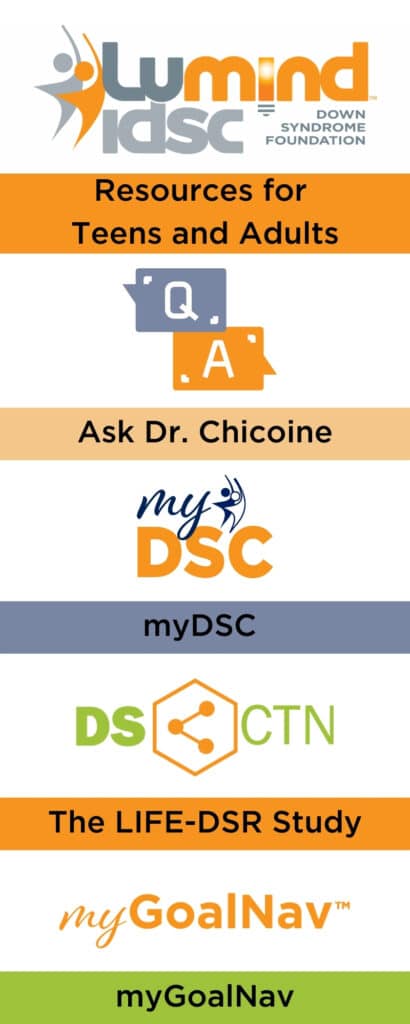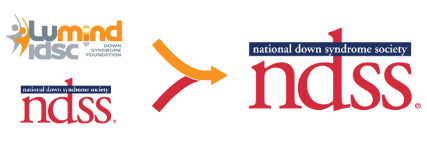May 10, 2021
Have you heard of myDSC’s feature “Ask Dr. Chicoine”? It is a convenient and reliable tool where members can ask an expert health-related questions for people with Down syndrome.
LuMind IDSC sat with Dr. Brian Chicoine and asked him about his passion for working with the Down syndrome community, his concerns on the lack of information about the aging population, and other factors that have impelled him to share his knowledge and expertise for the advancement of research and medical treatments for people with Down syndrome.Dr. Brian Chicoine has provided medical care to individuals with Down syndrome for over 30 years. He graduated from Loyola University of Chicago Stritch School of Medicine and completed his Family Medicine residency at Lutheran General Hospital. That is where he first started treating patients with Down syndrome, which would later play a pivotal role in his career. Dr. Chicoine is co-founder of the Adult Down Syndrome Center in Park Ridge, Illinois, and he is also an award-winning author who co-authored two books on mental and physical health for adolescents and adults with Down syndrome.Back in the early 90’s, the local parents at Park Ridge, Illinois, saw the need for a clinic that would provide care exclusively for individuals with Down syndrome. Since Dr. Chicoine had experience with the Down syndrome population during his early years as a physician at the Freeport Clinic in Illinois, he started working at a small practice that operated two mornings every month. In response to increased demand, that small practice quickly grew into a multidisciplinary clinic with multiple physicians, nurses, and mental health providers that went on to become the nationally recognized Adult Down Syndrome Center
The more Dr. Chicoine worked with people with Down syndrome, the more he started to comprehend the existence of gaps in knowledge about treatment, screening, and co-occurring diseases on the aging population. A critical cause for concern was the lack of information in Alzheimer’s disease research on people with Down syndrome.
People with Down syndrome are living longer, and we need to think of ways how we can address the issue and possibly prevent or treat it. We need more information on how to best treat the symptoms like memory and mood and if we cannot yet find a cure, we should know more about how to control it and address the symptoms,” he remarked. “The goal is that soon there will be a system to prevent it or a medication that will stop it in its tracks and will reverse the damage.” Dr. Chicoine noted how much change has taken place in the last few decades for the Down syndrome population. His great uncle, diagnosed with Down syndrome, was born in 1907. Back then, his life expectancy was nine years old, but he went on to live a longer life. In 1984 when Dr. Chicoine graduated from Medical School, the life expectancy of people with Down syndrome had scarcely increased to 28.
Dr. Chicoine noted how much change has taken place in the last few decades for the Down syndrome population. His great uncle, diagnosed with Down syndrome, was born in 1907. Back then, his life expectancy was nine years old, but he went on to live a longer life. In 1984 when Dr. Chicoine graduated from Medical School, the life expectancy of people with Down syndrome had scarcely increased to 28.
Even though today the life expectancy of individuals with Down syndrome is 60 years old, a lot of it has to do with the ability to treat congenital heart disease,” observed Dr. Chicoine. “Close to 40% of children with Down syndrome are born with heart disease. “
In Chicago, until the launch of the Adult Down Syndrome Center, community and healthcare groups worked primarily with children. The caregivers and parents of adults with Down syndrome, realized that their adult loved ones were not getting medical care to the level they needed.
Dr. Chicoine recalled how “back then we had this growing adult population and not much known about them or how to provide for them medically. So, it became a “learn as you go” type of effort.”
Today, the population of individuals with Down syndrome is in the hundreds of thousands and a great percentage of those are adults. Adults and adolescents whose various co-occurring health conditions make it more challenging for them to live full, independent, and healthier lives.
Finding Solutions
Only about 5% of the population with Down syndrome have access to specialized clinics. Many physicians, including Dr. Chicoine point out a troubling obstacle is the deficiency of training in medical schools on how to manage and treat individuals with Down syndrome. A lot of providers may have one or two patients with Down syndrome in their practice and yet, they are not familiar with their co-occurring issues and do not have enough information on symptoms and depend on the parents and caregivers to obtain this information. Historically, parents and caregivers have always been deeply involved in the health and wellness of their loved one with Down syndrome. They often try to absorb every important piece of information that they can later share with their provider.
Dr. Chicoine recognized that “LuMind IDSC plays such an important role trying to get the information into the hands of families of people with Down syndrome, and eventually into the hands of providers.” Currently, this responsibility lies on the shoulders of parents and caregivers.
How Can the Service “Ask Dr. Chicoine” Help Propagate Reliable Information?
Another major challenge is the wealth of misinformation about Down syndrome. “In an organization like LuMind IDSC with a large followership, there is a tremendous opportunity in getting access to reliable information and sharing it. Historically we know that the parents will transmit the information to the medical provider. Information spreads like wildfire and soon it will reach other local parents and providers,” said Dr. Chicoine.
Although Dr. Chicoine cannot provide medical care individually through this channel, there is the potential to answer general questions that more people might relate to such as: “What are the symptoms of depression? What’s unique about depression?” likely questions that might surge related to someone with Down syndrome. Then the reader, armed with these tools can take them to their provider.
Do you have any health-related questions? Leave it to the experts. Sign up to myDSC and Ask Dr. Chicoine!
